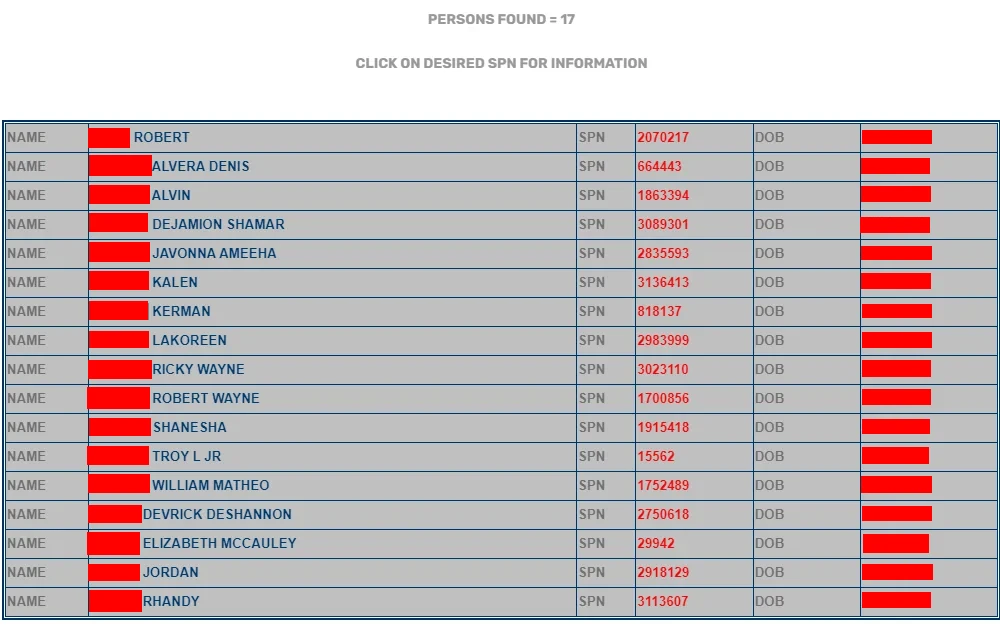Harris Inmate Records: Your Ultimate Guide To Understanding And Accessing Them
So, let’s get this straight—Harris inmate records are something you’ve probably heard about, but never really dug into, right? Well, buckle up because we’re about to break it down for you. Whether you’re a concerned family member, a legal professional, or just someone curious about the justice system, this guide has got you covered. We’ll dive deep into what these records are, how they work, and why they matter.
Now, before we jump into the nitty-gritty, let’s talk about why Harris inmate records are such a big deal. These documents aren’t just random files sitting in some dusty office. They’re official records that hold critical information about individuals who are currently incarcerated or have been in the Harris County jail system. Think of them as a digital breadcrumb trail that helps people track, verify, and understand the legal status of someone they care about.
But hey, don’t worry—we’re not just throwing facts at you. This article is designed to be your go-to resource, breaking everything down in a way that’s easy to follow, super informative, and packed with actionable tips. So, whether you’re looking for a specific record or just want to know more about the system, you’re in the right place.
Read also:Meet Meredith Vieiras Kids Benjamin Gabriel And Lily Cohen
What Exactly Are Harris Inmate Records?
Alright, let’s start with the basics. Harris inmate records refer to official documents maintained by the Harris County Sheriff’s Office (HCSO) and other related authorities. These records contain essential details about individuals who are currently detained or have been detained in the past. Think of them as a digital dossier that tracks everything from arrest dates to release statuses.
Now, why are these records so important? Well, for one, they play a crucial role in ensuring transparency within the criminal justice system. They provide a clear picture of what’s happening behind bars, allowing families, lawyers, and even the general public to stay informed. Plus, they’re a vital tool for anyone navigating legal processes, whether it’s bail hearings, court appearances, or parole decisions.
Breaking Down the Key Components of Harris Inmate Records
So, what kind of info can you expect to find in these records? Here’s a quick rundown:
- Personal Details: Name, date of birth, and booking photo (yep, the mugshot).
- Arrest Information: Date and time of arrest, as well as the charges filed.
- Case Status: Current legal status, including bail amounts, court dates, and release information.
- Additional Notes: Any relevant notes from law enforcement, such as special conditions or holds.
These components paint a comprehensive picture of an inmate’s journey through the system. Whether you’re trying to locate someone or gather evidence for a legal case, these details are invaluable.
How to Access Harris Inmate Records
Now that you know what these records are, let’s talk about how to get your hands on them. Accessing Harris inmate records is easier than you might think, thanks to modern technology and the internet. Most of the information is available online through official databases maintained by the Harris County Sheriff’s Office.
Here’s a step-by-step guide:
Read also:Kristen Bell Hollywoods Stylish Mom And Her Inspiring Journey
- Visit the official Harris County Sheriff’s Office website.
- Look for the “Inmate Lookup” or “Inmate Information” section.
- Enter the inmate’s full name or booking number.
- Review the results, which will include all the details mentioned earlier.
But wait, what if you can’t find what you’re looking for online? Don’t panic. You can always reach out to the jail directly or visit in person to request more detailed records. Just remember to bring proper identification and any necessary documentation.
Tips for Efficiently Searching Harris Inmate Records
Searching for inmate records can sometimes feel like trying to find a needle in a haystack. To make the process smoother, here are a few pro tips:
- Double-check the spelling of names to avoid errors.
- Use multiple search criteria, like date of birth or booking number, for more accurate results.
- If you’re searching for a common name, try narrowing down the results by adding additional filters.
By following these tips, you’ll be able to locate the records you need in no time.
Understanding the Legal Implications of Harris Inmate Records
Now, let’s shift gears and talk about the legal side of things. Harris inmate records aren’t just random files—they’re official documents that can have significant legal implications. For instance, they can be used as evidence in court, help determine bail amounts, or even influence parole decisions.
But here’s the thing: while these records are public, there are rules and regulations governing how they can be accessed and used. Misusing inmate records can lead to serious legal consequences, so it’s important to handle them with care.
Key Legal Considerations to Keep in Mind
Here are a few key points to remember:
- Always use inmate records for legitimate purposes only.
- Respect the privacy of individuals whose records you’re accessing.
- If you’re using these records for legal purposes, make sure you’re complying with all relevant laws and regulations.
By staying informed and following the rules, you can ensure that you’re using Harris inmate records responsibly and effectively.
The Role of Technology in Managing Harris Inmate Records
Technology has revolutionized the way inmate records are managed and accessed. Gone are the days of sifting through piles of paper files. Today, most inmate records are digitized, making them easier to search, store, and share.
This shift to digital systems has brought several benefits, including increased efficiency, improved accuracy, and enhanced security. However, it’s also introduced new challenges, such as data privacy concerns and cybersecurity threats.
Benefits and Challenges of Digital Inmate Records
Let’s break down the pros and cons:
- Benefits: Faster access, better organization, and easier sharing of information.
- Challenges: Data breaches, privacy issues, and the need for constant updates to software systems.
Despite these challenges, the move to digital systems has largely been a positive development for both law enforcement agencies and the public.
Why Harris Inmate Records Matter
So, why should you care about Harris inmate records? Well, for starters, they play a crucial role in promoting transparency and accountability within the justice system. By providing access to these records, authorities allow the public to stay informed and engaged in the legal process.
Additionally, these records can be a lifeline for families and friends of inmates, offering much-needed updates and peace of mind. They can also be a valuable resource for legal professionals, helping them build stronger cases and advocate for their clients more effectively.
Real-Life Examples of How Harris Inmate Records Make a Difference
Here are a couple of examples:
- A family uses inmate records to track the status of a loved one and ensure they’re receiving proper care while incarcerated.
- A lawyer accesses these records to gather evidence for a client’s defense, ultimately helping secure a favorable outcome in court.
These stories highlight the real-world impact of Harris inmate records and why they’re such an important tool.
Common Misconceptions About Harris Inmate Records
There are a lot of myths and misconceptions floating around about Harris inmate records. Let’s clear a few of them up:
Myth #1: Inmate records are only available to lawyers and law enforcement.
Reality: Nope! These records are public information, meaning anyone can access them with the right tools and resources.
Myth #2: All inmate records are 100% accurate.
Reality: While most records are accurate, errors can and do happen. That’s why it’s always a good idea to double-check the information.
By understanding the truth behind these misconceptions, you’ll be better equipped to navigate the world of Harris inmate records.
How to Verify the Accuracy of Inmate Records
Here are some tips for ensuring the records you’re accessing are accurate:
- Compare the information with other reliable sources.
- Contact the jail or law enforcement agency directly if you suspect an error.
- Use multiple search methods to cross-reference details.
By taking these steps, you can help ensure that the records you’re relying on are as accurate as possible.
Future Developments in Harris Inmate Records
As technology continues to evolve, so too will the way Harris inmate records are managed and accessed. We can expect to see advancements in areas like data security, user-friendly interfaces, and expanded access options.
For example, imagine being able to access inmate records through a mobile app or receiving real-time updates via text message. These innovations could make the process even more convenient and efficient for everyone involved.
What to Expect in the Coming Years
Here are a few potential developments to keep an eye on:
- Enhanced cybersecurity measures to protect sensitive information.
- More user-friendly online platforms for accessing records.
- Increased integration with other legal and law enforcement systems.
These advancements promise to make Harris inmate records even more accessible and valuable in the future.
Conclusion: Taking Action with Harris Inmate Records
And there you have it—a comprehensive guide to Harris inmate records. From understanding what they are to accessing them and using them responsibly, we’ve covered it all. Whether you’re a family member, a legal professional, or just someone interested in the justice system, these records are a powerful tool that can make a real difference.
So, what’s next? Take action! If you’re looking for specific records, start your search today. If you’re just curious about the system, keep exploring and learning. And don’t forget to share this article with anyone who might find it useful. Together, we can promote transparency, accountability, and justice for all.
Table of Contents
- What Exactly Are Harris Inmate Records?
- How to Access Harris Inmate Records
- Understanding the Legal Implications of Harris Inmate Records
- The Role of Technology in Managing Harris Inmate Records
- Why Harris Inmate Records Matter
- Common Misconceptions About Harris Inmate Records
- Future Developments in Harris Inmate Records
- Conclusion: Taking Action with Harris Inmate Records
Remember, knowledge is power. Stay informed, stay engaged, and let Harris inmate records be your guide through the complexities of the justice system.
Article Recommendations

